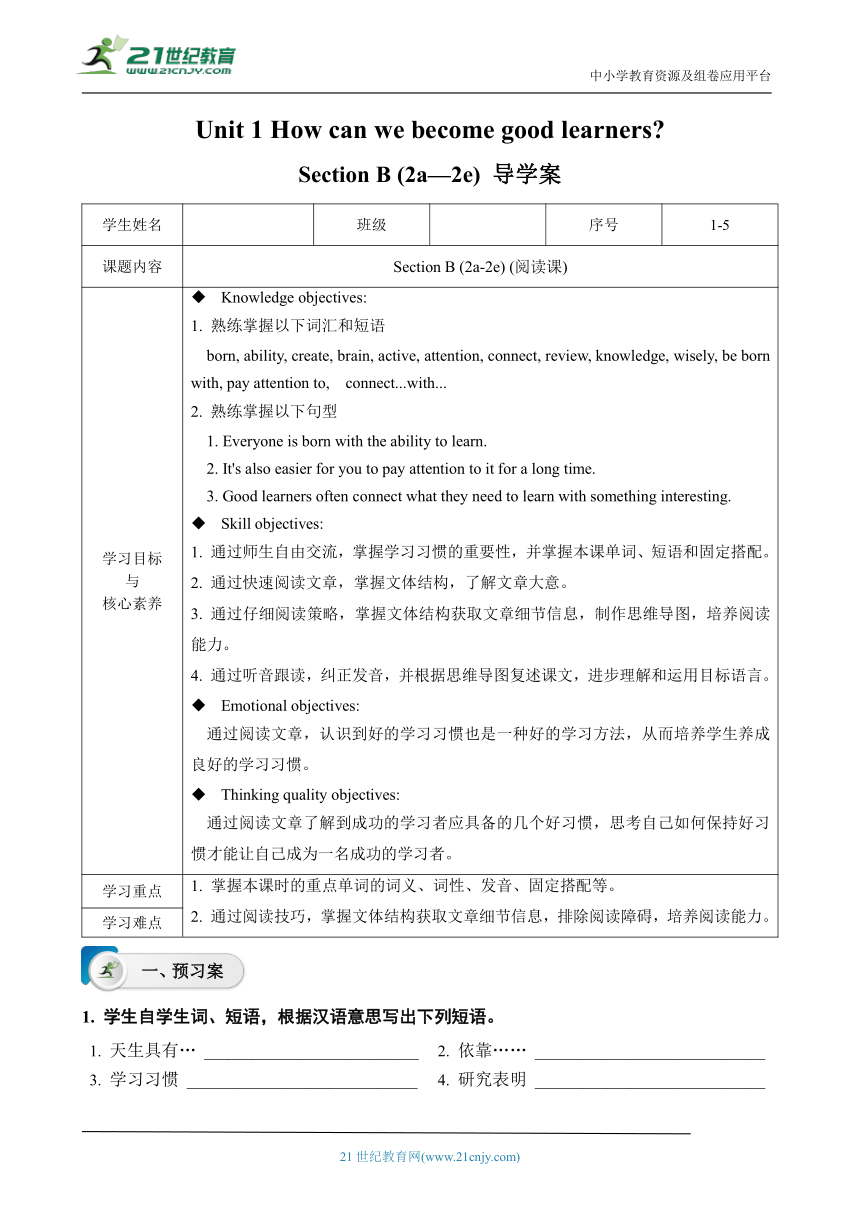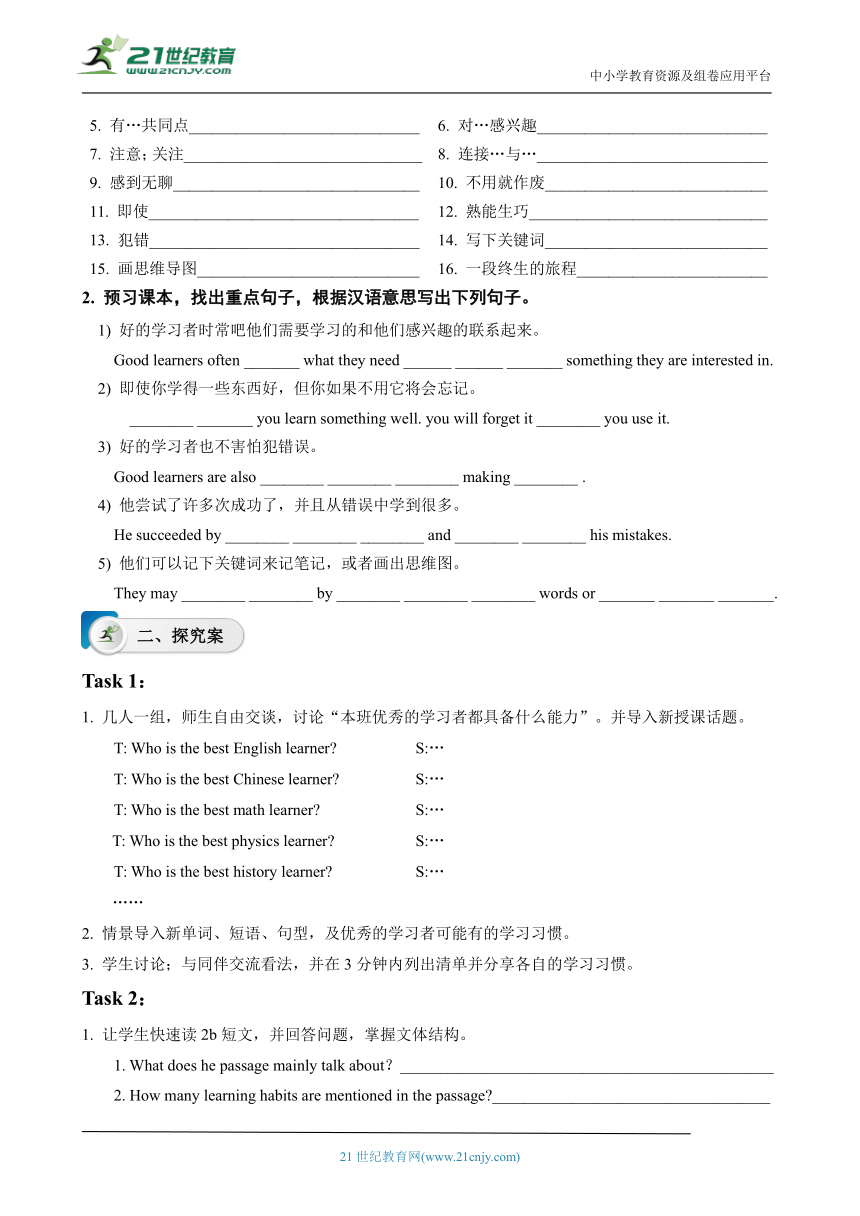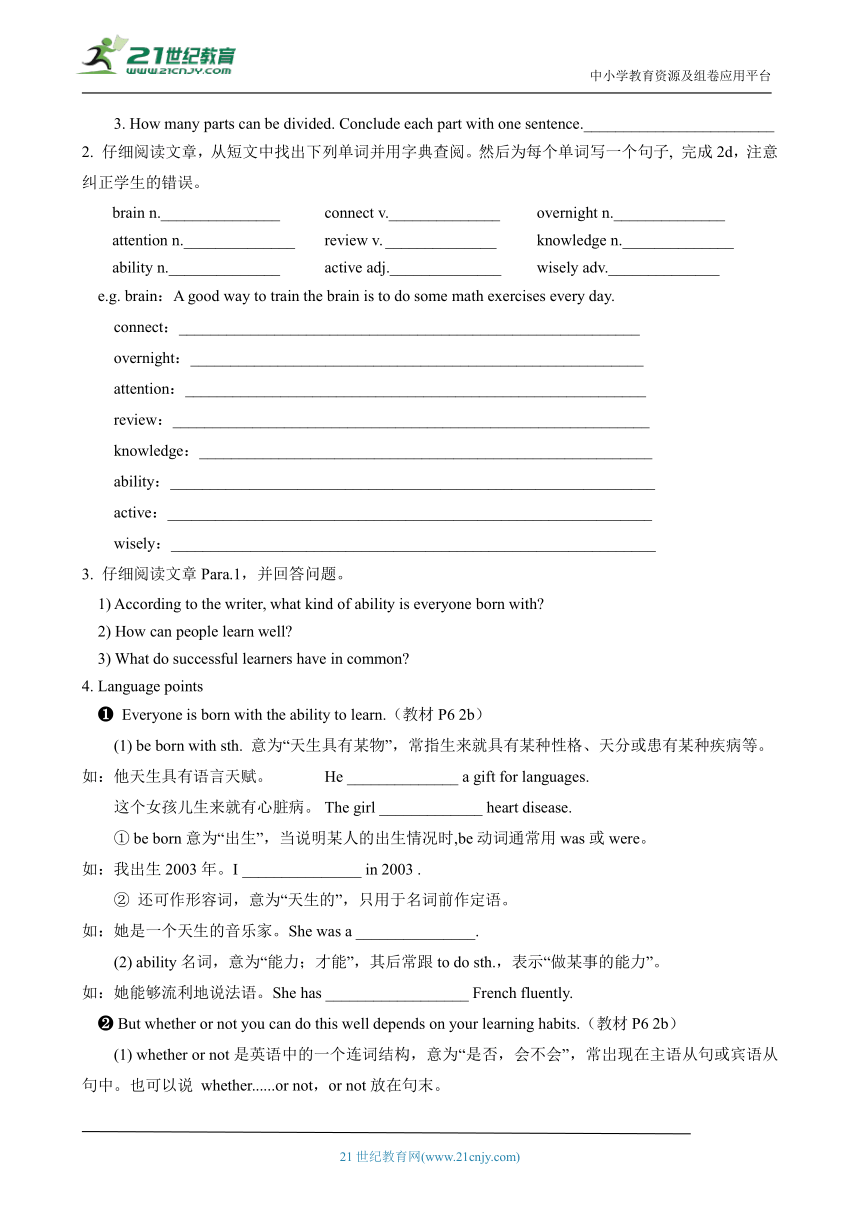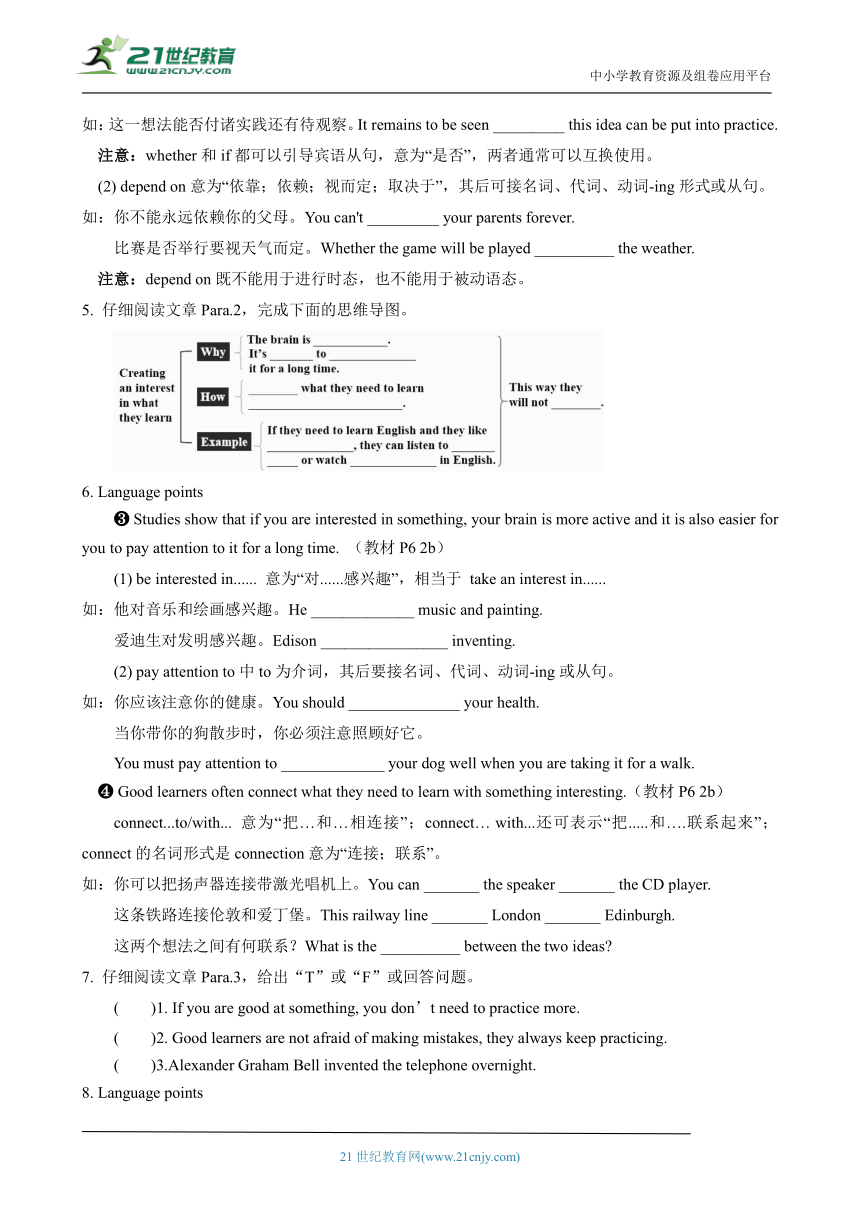【核心素养目标】Unit 1 How can we become good learners Section B 2a-2e 导学案
文档属性
| 名称 | 【核心素养目标】Unit 1 How can we become good learners Section B 2a-2e 导学案 |  | |
| 格式 | docx | ||
| 文件大小 | 1.5MB | ||
| 资源类型 | 试卷 | ||
| 版本资源 | 人教新目标(Go for it)版 | ||
| 科目 | 英语 | ||
| 更新时间 | 2022-08-22 11:46:52 | ||
图片预览




文档简介
中小学教育资源及组卷应用平台
Unit 1 How can we become good learners
Section B (2a—2e) 导学案
学生姓名 班级 序号 1-5
课题内容 Section B (2a-2e) (阅读课)
学习目标 与 核心素养 Knowledge objectives: 1. 熟练掌握以下词汇和短语 born, ability, create, brain, active, attention, connect, review, knowledge, wisely, be born with, pay attention to, connect...with... 2. 熟练掌握以下句型 1. Everyone is born with the ability to learn. 2. It's also easier for you to pay attention to it for a long time. 3. Good learners often connect what they need to learn with something interesting. Skill objectives: 1. 通过师生自由交流,掌握学习习惯的重要性,并掌握本课单词、短语和固定搭配。 2. 通过快速阅读文章,掌握文体结构,了解文章大意。 3. 通过仔细阅读策略,掌握文体结构获取文章细节信息,制作思维导图,培养阅读能力。 4. 通过听音跟读,纠正发音,并根据思维导图复述课文,进步理解和运用目标语言。 Emotional objectives: 通过阅读文章,认识到好的学习习惯也是一种好的学习方法,从而培养学生养成良好的学习习惯。 Thinking quality objectives: 通过阅读文章了解到成功的学习者应具备的几个好习惯,思考自己如何保持好习惯才能让自己成为一名成功的学习者。
学习重点 掌握本课时的重点单词的词义、词性、发音、固定搭配等。 通过阅读技巧,掌握文体结构获取文章细节信息,排除阅读障碍,培养阅读能力。
学习难点
1. 学生自学生词、短语,根据汉语意思写出下列短语。
天生具有… ___________________________ 依靠…… _____________________________
学习习惯 _____________________________ 研究表明 _____________________________
有…共同点_____________________________ 对…感兴趣_____________________________
注意;关注______________________________ 连接…与…_____________________________
感到无聊_______________________________ 不用就作废____________________________
即使__________________________________ 熟能生巧______________________________
犯错__________________________________ 写下关键词____________________________
画思维导图____________________________ 一段终生的旅程________________________
预习课本,找出重点句子,根据汉语意思写出下列句子。
1) 好的学习者时常吧他们需要学习的和他们感兴趣的联系起来。
Good learners often _______ what they need ______ ______ _______ something they are interested in.
2) 即使你学得一些东西好,但你如果不用它将会忘记。
________ _______ you learn something well. you will forget it ________ you use it.
3) 好的学习者也不害怕犯错误。
Good learners are also ________ ________ ________ making ________ .
4) 他尝试了许多次成功了,并且从错误中学到很多。
He succeeded by ________ ________ ________ and ________ ________ his mistakes.
5) 他们可以记下关键词来记笔记,或者画出思维图。
They may ________ ________ by ________ ________ ________ words or _______ _______ _______.
Task 1:
1. 几人一组,师生自由交谈,讨论“本班优秀的学习者都具备什么能力”。并导入新授课话题。
T: Who is the best English learner S:…
T: Who is the best Chinese learner S:…
T: Who is the best math learner S:…
T: Who is the best physics learner S:…
T: Who is the best history learner S:…
……
2. 情景导入新单词、短语、句型,及优秀的学习者可能有的学习习惯。
3. 学生讨论;与同伴交流看法,并在3分钟内列出清单并分享各自的学习习惯。
Task 2:
1. 让学生快速读2b短文,并回答问题,掌握文体结构。
1. What does he passage mainly talk about?_______________________________________________
2. How many learning habits are mentioned in the passage ___________________________________
3. How many parts can be divided. Conclude each part with one sentence.________________________
2. 仔细阅读文章,从短文中找出下列单词并用字典查阅。然后为每个单词写一个句子, 完成2d,注意纠正学生的错误。
brain n._______________ connect v.______________ overnight n.______________
attention n.______________ review v. ______________ knowledge n.______________
ability n.______________ active adj.______________ wisely adv.______________
e.g. brain:A good way to train the brain is to do some math exercises every day.
connect:__________________________________________________________
overnight:_________________________________________________________
attention:__________________________________________________________
review:____________________________________________________________
knowledge:_________________________________________________________
ability:_____________________________________________________________
active:_____________________________________________________________
wisely:_____________________________________________________________
3. 仔细阅读文章Para.1,并回答问题。
1) According to the writer, what kind of ability is everyone born with
2) How can people learn well
3) What do successful learners have in common
4. Language points
Everyone is born with the ability to learn.(教材P6 2b)
(1) be born with sth. 意为“天生具有某物”,常指生来就具有某种性格、天分或患有某种疾病等。
如:他天生具有语言天赋。 He ______________ a gift for languages.
这个女孩儿生来就有心脏病。 The girl _____________ heart disease.
① be born意为“出生”,当说明某人的出生情况时,be动词通常用was或were。
如:我出生2003年。I _______________ in 2003 .
② 还可作形容词,意为“天生的”,只用于名词前作定语。
如:她是一个天生的音乐家。She was a _______________.
(2) ability名词,意为“能力;才能”,其后常跟to do sth.,表示“做某事的能力”。
如:她能够流利地说法语。She has __________________ French fluently.
But whether or not you can do this well depends on your learning habits.(教材P6 2b)
(1) whether or not是英语中的一个连词结构,意为“是否,会不会”,常岀现在主语从句或宾语从句中。也可以说 whether......or not,or not放在句末。
如:这一想法能否付诸实践还有待观察。It remains to be seen _________ this idea can be put into practice.
注意:whether和if都可以引导宾语从句,意为“是否”,两者通常可以互换使用。
(2) depend on意为“依靠;依赖;视而定;取决于”,其后可接名词、代词、动词-ing形式或从句。
如:你不能永远依赖你的父母。You can't _________ your parents forever.
比赛是否举行要视天气而定。Whether the game will be played __________ the weather.
注意:depend on既不能用于进行时态,也不能用于被动语态。
5. 仔细阅读文章Para.2,完成下面的思维导图。
6. Language points
Studies show that if you are interested in something, your brain is more active and it is also easier for you to pay attention to it for a long time. (教材P6 2b)
(1) be interested in...... 意为“对......感兴趣”,相当于 take an interest in......
如:他对音乐和绘画感兴趣。He _____________ music and painting.
爱迪生对发明感兴趣。Edison ________________ inventing.
(2) pay attention to中to为介词,其后要接名词、代词、动词-ing或从句。
如:你应该注意你的健康。You should ______________ your health.
当你带你的狗散步时,你必须注意照顾好它。
You must pay attention to _____________ your dog well when you are taking it for a walk.
Good learners often connect what they need to learn with something interesting.(教材P6 2b)
connect...to/with... 意为“把…和…相连接”;connect… with...还可表示“把.....和….联系起来”;connect的名词形式是connection意为“连接;联系”。
如:你可以把扬声器连接带激光唱机上。You can _______ the speaker _______ the CD player.
这条铁路连接伦敦和爱丁堡。This railway line _______ London _______ Edinburgh.
这两个想法之间有何联系?What is the __________ between the two ideas
7. 仔细阅读文章Para.3,给出“T”或“F”或回答问题。
( )1. If you are good at something, you don’t need to practice more.
( )2. Good learners are not afraid of making mistakes, they always keep practicing.
( )3.Alexander Graham Bell invented the telephone overnight.
8. Language points
Even if you learn something well, you will forget it unless you use it. (教材P6 2b)
(1) Even if意为“即使;尽管”,用来引导让步状语从句,相当于even though。
如:即使下雨,我们还是每天散步。_________ it's raining, we go for a walk every day.
尽管她嘲笑他,他还是很喜欢她。______________ she laughs at him, he likes her.
★ even if/though不能与连词but用在同一个句子中,但可以与yet,still等副词连用。 与although/though引导让步状语从句的用法类似。
(2) unless连词,意为“除非;如果不”,引导条件状语从句,相当于if…not…。当主句用一般将来时或祈使句时,unless引导的从句常用一般现在时。
如:我们如果不与人聊聊,肯定会感觉更糟。________we talk to someone, well certainly feel worse.
除非你给我回信,我就不去那里了。I won’t go there ______ I hear from you.(改同义句)
I won’t go there _______ I _______hear from you.
9. 仔细阅读文章Para.4,完成下面的思维导图。
10. Language points
(1)review在此处作动词,由“re-(前缀)+view (v.仔细查看,观看)构 成”。意为 “回顾,复习”。
如:他想复习老师在课堂上说的话。He wants to ______ what the teacher said in class.
(2)review还可作名词,意为 “回顾;复习” 。
如:老板要求员工写一份今年的回顾。The boss asked the staff to write a _______ of this year.
11. 仔细阅读文章Para.5,并回答问题。
1) When do good learners often ask questions ______________________________________________
2) Why do they ask questions ___________________________________________________________
3) 译 “Knowledge comes from questioning”.______________________________________________
12. 仔细阅读文章Para.6,并回答问题。
1) 译: Learning is a lifelong journey because every day brings something new.
___________________________________________________________
2) So what should you do ___________________________________________________________
13. 在读一次文章,并回答2c问题,并集体核对答案。
14. 根据思维导图,复述课文。
15. 让学生分组完成2e的调查和讨论,并找学生展示自己的调查结果。
1. 根据句意及首字母或汉语提示完成单词。
The clever boy has the a__________ to learn English well, but he is very lazy.
We should r__________ what we have learned in time every day.
Our history teacher is a man with lots of k__________ and he makes his classes very interesting.
My cousin is very __________(活跃的) and he likes many sports.
You can't learn math well __________(一夜之间). You should keep practicing and not give up.
Try your best and you will __________(创造) a new future.
2. 单项选择。
It is not enough ________ English in class. We should speak more with others.
A. say B. to read C. to reading D. speak
—What can I do first
—You should connect the laptop(笔记本电脑) ________ the Internet.
A. to B. for C. from D. by
You need ________ your study skills.
A. developing B. development
C. to develop D. to developing
The inventor succeeded after ________ many times. We should learn ________ him.
A. try; to B. try; from
C. trying; to D. trying; from
I ________ my lost bag everywhere, but I didn't ________ it anywhere.
A. look for; find B. looked for; find
C. found; find out D. looked for; find out
3. 选词填空。
A good way ________(keep, to keep) healthy is to exercise every morning.
We all think ________(learn, learning) is the most important thing in our life.
The girl's parents think she is born ________(to, with) the ability to play the piano.
If you have an ________(interest, interested) in something, you can learn it better.
Does the police ________(find, find out) who killed the famous singer
训练案答案
1. 根据句意及首字母或汉语提示完成单词。
ability review knowledge active overnight create
2. 单项选择。
B A C D B
3. 选词填空。
to keep learning with interest find out
21世纪教育网 www.21cnjy.com 精品试卷·第 2 页 (共 2 页)
21世纪教育网(www.21cnjy.com)
Unit 1 How can we become good learners
Section B (2a—2e) 导学案
学生姓名 班级 序号 1-5
课题内容 Section B (2a-2e) (阅读课)
学习目标 与 核心素养 Knowledge objectives: 1. 熟练掌握以下词汇和短语 born, ability, create, brain, active, attention, connect, review, knowledge, wisely, be born with, pay attention to, connect...with... 2. 熟练掌握以下句型 1. Everyone is born with the ability to learn. 2. It's also easier for you to pay attention to it for a long time. 3. Good learners often connect what they need to learn with something interesting. Skill objectives: 1. 通过师生自由交流,掌握学习习惯的重要性,并掌握本课单词、短语和固定搭配。 2. 通过快速阅读文章,掌握文体结构,了解文章大意。 3. 通过仔细阅读策略,掌握文体结构获取文章细节信息,制作思维导图,培养阅读能力。 4. 通过听音跟读,纠正发音,并根据思维导图复述课文,进步理解和运用目标语言。 Emotional objectives: 通过阅读文章,认识到好的学习习惯也是一种好的学习方法,从而培养学生养成良好的学习习惯。 Thinking quality objectives: 通过阅读文章了解到成功的学习者应具备的几个好习惯,思考自己如何保持好习惯才能让自己成为一名成功的学习者。
学习重点 掌握本课时的重点单词的词义、词性、发音、固定搭配等。 通过阅读技巧,掌握文体结构获取文章细节信息,排除阅读障碍,培养阅读能力。
学习难点
1. 学生自学生词、短语,根据汉语意思写出下列短语。
天生具有… ___________________________ 依靠…… _____________________________
学习习惯 _____________________________ 研究表明 _____________________________
有…共同点_____________________________ 对…感兴趣_____________________________
注意;关注______________________________ 连接…与…_____________________________
感到无聊_______________________________ 不用就作废____________________________
即使__________________________________ 熟能生巧______________________________
犯错__________________________________ 写下关键词____________________________
画思维导图____________________________ 一段终生的旅程________________________
预习课本,找出重点句子,根据汉语意思写出下列句子。
1) 好的学习者时常吧他们需要学习的和他们感兴趣的联系起来。
Good learners often _______ what they need ______ ______ _______ something they are interested in.
2) 即使你学得一些东西好,但你如果不用它将会忘记。
________ _______ you learn something well. you will forget it ________ you use it.
3) 好的学习者也不害怕犯错误。
Good learners are also ________ ________ ________ making ________ .
4) 他尝试了许多次成功了,并且从错误中学到很多。
He succeeded by ________ ________ ________ and ________ ________ his mistakes.
5) 他们可以记下关键词来记笔记,或者画出思维图。
They may ________ ________ by ________ ________ ________ words or _______ _______ _______.
Task 1:
1. 几人一组,师生自由交谈,讨论“本班优秀的学习者都具备什么能力”。并导入新授课话题。
T: Who is the best English learner S:…
T: Who is the best Chinese learner S:…
T: Who is the best math learner S:…
T: Who is the best physics learner S:…
T: Who is the best history learner S:…
……
2. 情景导入新单词、短语、句型,及优秀的学习者可能有的学习习惯。
3. 学生讨论;与同伴交流看法,并在3分钟内列出清单并分享各自的学习习惯。
Task 2:
1. 让学生快速读2b短文,并回答问题,掌握文体结构。
1. What does he passage mainly talk about?_______________________________________________
2. How many learning habits are mentioned in the passage ___________________________________
3. How many parts can be divided. Conclude each part with one sentence.________________________
2. 仔细阅读文章,从短文中找出下列单词并用字典查阅。然后为每个单词写一个句子, 完成2d,注意纠正学生的错误。
brain n._______________ connect v.______________ overnight n.______________
attention n.______________ review v. ______________ knowledge n.______________
ability n.______________ active adj.______________ wisely adv.______________
e.g. brain:A good way to train the brain is to do some math exercises every day.
connect:__________________________________________________________
overnight:_________________________________________________________
attention:__________________________________________________________
review:____________________________________________________________
knowledge:_________________________________________________________
ability:_____________________________________________________________
active:_____________________________________________________________
wisely:_____________________________________________________________
3. 仔细阅读文章Para.1,并回答问题。
1) According to the writer, what kind of ability is everyone born with
2) How can people learn well
3) What do successful learners have in common
4. Language points
Everyone is born with the ability to learn.(教材P6 2b)
(1) be born with sth. 意为“天生具有某物”,常指生来就具有某种性格、天分或患有某种疾病等。
如:他天生具有语言天赋。 He ______________ a gift for languages.
这个女孩儿生来就有心脏病。 The girl _____________ heart disease.
① be born意为“出生”,当说明某人的出生情况时,be动词通常用was或were。
如:我出生2003年。I _______________ in 2003 .
② 还可作形容词,意为“天生的”,只用于名词前作定语。
如:她是一个天生的音乐家。She was a _______________.
(2) ability名词,意为“能力;才能”,其后常跟to do sth.,表示“做某事的能力”。
如:她能够流利地说法语。She has __________________ French fluently.
But whether or not you can do this well depends on your learning habits.(教材P6 2b)
(1) whether or not是英语中的一个连词结构,意为“是否,会不会”,常岀现在主语从句或宾语从句中。也可以说 whether......or not,or not放在句末。
如:这一想法能否付诸实践还有待观察。It remains to be seen _________ this idea can be put into practice.
注意:whether和if都可以引导宾语从句,意为“是否”,两者通常可以互换使用。
(2) depend on意为“依靠;依赖;视而定;取决于”,其后可接名词、代词、动词-ing形式或从句。
如:你不能永远依赖你的父母。You can't _________ your parents forever.
比赛是否举行要视天气而定。Whether the game will be played __________ the weather.
注意:depend on既不能用于进行时态,也不能用于被动语态。
5. 仔细阅读文章Para.2,完成下面的思维导图。
6. Language points
Studies show that if you are interested in something, your brain is more active and it is also easier for you to pay attention to it for a long time. (教材P6 2b)
(1) be interested in...... 意为“对......感兴趣”,相当于 take an interest in......
如:他对音乐和绘画感兴趣。He _____________ music and painting.
爱迪生对发明感兴趣。Edison ________________ inventing.
(2) pay attention to中to为介词,其后要接名词、代词、动词-ing或从句。
如:你应该注意你的健康。You should ______________ your health.
当你带你的狗散步时,你必须注意照顾好它。
You must pay attention to _____________ your dog well when you are taking it for a walk.
Good learners often connect what they need to learn with something interesting.(教材P6 2b)
connect...to/with... 意为“把…和…相连接”;connect… with...还可表示“把.....和….联系起来”;connect的名词形式是connection意为“连接;联系”。
如:你可以把扬声器连接带激光唱机上。You can _______ the speaker _______ the CD player.
这条铁路连接伦敦和爱丁堡。This railway line _______ London _______ Edinburgh.
这两个想法之间有何联系?What is the __________ between the two ideas
7. 仔细阅读文章Para.3,给出“T”或“F”或回答问题。
( )1. If you are good at something, you don’t need to practice more.
( )2. Good learners are not afraid of making mistakes, they always keep practicing.
( )3.Alexander Graham Bell invented the telephone overnight.
8. Language points
Even if you learn something well, you will forget it unless you use it. (教材P6 2b)
(1) Even if意为“即使;尽管”,用来引导让步状语从句,相当于even though。
如:即使下雨,我们还是每天散步。_________ it's raining, we go for a walk every day.
尽管她嘲笑他,他还是很喜欢她。______________ she laughs at him, he likes her.
★ even if/though不能与连词but用在同一个句子中,但可以与yet,still等副词连用。 与although/though引导让步状语从句的用法类似。
(2) unless连词,意为“除非;如果不”,引导条件状语从句,相当于if…not…。当主句用一般将来时或祈使句时,unless引导的从句常用一般现在时。
如:我们如果不与人聊聊,肯定会感觉更糟。________we talk to someone, well certainly feel worse.
除非你给我回信,我就不去那里了。I won’t go there ______ I hear from you.(改同义句)
I won’t go there _______ I _______hear from you.
9. 仔细阅读文章Para.4,完成下面的思维导图。
10. Language points
(1)review在此处作动词,由“re-(前缀)+view (v.仔细查看,观看)构 成”。意为 “回顾,复习”。
如:他想复习老师在课堂上说的话。He wants to ______ what the teacher said in class.
(2)review还可作名词,意为 “回顾;复习” 。
如:老板要求员工写一份今年的回顾。The boss asked the staff to write a _______ of this year.
11. 仔细阅读文章Para.5,并回答问题。
1) When do good learners often ask questions ______________________________________________
2) Why do they ask questions ___________________________________________________________
3) 译 “Knowledge comes from questioning”.______________________________________________
12. 仔细阅读文章Para.6,并回答问题。
1) 译: Learning is a lifelong journey because every day brings something new.
___________________________________________________________
2) So what should you do ___________________________________________________________
13. 在读一次文章,并回答2c问题,并集体核对答案。
14. 根据思维导图,复述课文。
15. 让学生分组完成2e的调查和讨论,并找学生展示自己的调查结果。
1. 根据句意及首字母或汉语提示完成单词。
The clever boy has the a__________ to learn English well, but he is very lazy.
We should r__________ what we have learned in time every day.
Our history teacher is a man with lots of k__________ and he makes his classes very interesting.
My cousin is very __________(活跃的) and he likes many sports.
You can't learn math well __________(一夜之间). You should keep practicing and not give up.
Try your best and you will __________(创造) a new future.
2. 单项选择。
It is not enough ________ English in class. We should speak more with others.
A. say B. to read C. to reading D. speak
—What can I do first
—You should connect the laptop(笔记本电脑) ________ the Internet.
A. to B. for C. from D. by
You need ________ your study skills.
A. developing B. development
C. to develop D. to developing
The inventor succeeded after ________ many times. We should learn ________ him.
A. try; to B. try; from
C. trying; to D. trying; from
I ________ my lost bag everywhere, but I didn't ________ it anywhere.
A. look for; find B. looked for; find
C. found; find out D. looked for; find out
3. 选词填空。
A good way ________(keep, to keep) healthy is to exercise every morning.
We all think ________(learn, learning) is the most important thing in our life.
The girl's parents think she is born ________(to, with) the ability to play the piano.
If you have an ________(interest, interested) in something, you can learn it better.
Does the police ________(find, find out) who killed the famous singer
训练案答案
1. 根据句意及首字母或汉语提示完成单词。
ability review knowledge active overnight create
2. 单项选择。
B A C D B
3. 选词填空。
to keep learning with interest find out
21世纪教育网 www.21cnjy.com 精品试卷·第 2 页 (共 2 页)
21世纪教育网(www.21cnjy.com)
同课章节目录
- Unit 1 How can we become good learners.
- Section A
- Section B
- Unit 2 I think that mooncakes are delicious!
- Section A
- Section B
- Unit 3 Could you please tell me where the restroom
- Section A
- Section B
- Unit 4 I used to be afraid of the dark.
- Section A
- Section B
- Unit 5 What are the shirts made of?
- Section A
- Section B
- Review of Units 1-5
- Unit 6 When was it invented?
- Section A
- Section B
- Unit 7 Teenagers should be allowed to choose their
- Section A
- Section B
- Unit 8 It must belong to Carla.
- Section A
- Section B
- Unit 9 I like music that I can dance to.
- Section A
- Section B
- Unit 10 You're supposed to shake hands.
- Section A
- Section B
- Review of Units 6-10
- Unit 11 Sad movies make me cry.
- Section A
- Section B
- Unit 12 Life is full of the unexpected
- Section A
- Section B
- Unit 13 We're trying to save the earth!
- Section A
- Section B
- Unit 14 I remember meeting all of you in Grade 7.
- Section A
- Section B
- Review of Units 11-14
